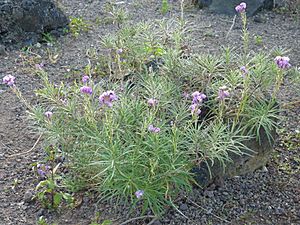Erysimum caboverdeanum facts for kids
Quick facts for kids Erysimum caboverdeanum |
|
|---|---|
 |
|
| Erysimum caboverdeanum at the botanical gardens in Las Palmas, Canary Islands | |
| Scientific classification | |
| Kingdom: | |
| (unranked): | |
| (unranked): | |
| (unranked): | |
| Order: | |
| Family: | |
| Genus: |
Erysimum
|
| Species: |
E. caboverdeanum
|
| Binomial name | |
| Erysimum caboveredanum (A.Chev.) Sunding, 1974
|
|
| Synonyms | |
|
Matthiola caboverdeana A.Chev. |
|
Erysimum caboverdeanum is a special plant found only on Fogo Island in Cape Verde. It belongs to the Brassicaceae family, which is also known as the cabbage or mustard family.
A French botanist named Auguste Jean Baptiste Chevalier first described this plant in 1935. Its name, caboverdeanum, comes from a Latin word meaning "from Cape Verde."
What's in a Name?
When Chevalier first named this plant in 1935, he called it Matthiola caboverdeana. Later, another scientist named Sunding changed its name to Erysimum caboverdeanum. Because of this, Matthiola caboverdeana is now considered an older, less common name for the plant.
Common Names
Locally, people on Fogo Island have two common names for this plant:
Description
Erysimum caboverdeanum is a small bush that lives for two years (this is called biennial). It can grow up to 60 centimeters (about 2 feet) tall. Its stems are woody and stand straight up.
The plant has narrow leaves that are about 4 centimeters (1.6 inches) long and 0.2 centimeters (0.08 inches) wide. The edges of the leaves are slightly toothed.
Its flowers are white or lilac in color. They grow in groups at the end of the stems. After the flowers, the plant produces very narrow fruits that also stand upright.
Where it Grows
This plant is endemic to the island of Fogo in Cape Verde. This means it naturally grows nowhere else in the world! You can find it on the volcano called Pico do Fogo.
It likes to grow in soil that has recently come from a volcano. It lives at high places, between 1,600 and 2,300 meters (about 5,250 to 7,550 feet) above sea level. You can spot it on the slopes of the volcano and in the flat area inside the volcanic crater, known as Chã das Caldeiras.
Uses
People on Fogo Island use Erysimum caboverdeanum for traditional medicinal purposes. They often make a drink from it, called an infusion.
This plant could also be used as an ornamental plant, meaning it could be grown in gardens for its beauty, even in places like central Europe.
Images for kids
 | Aaron Henry |
 | T. R. M. Howard |
 | Jesse Jackson |


